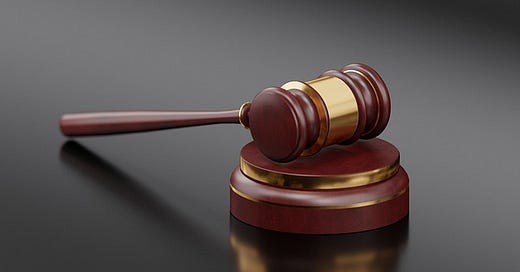Has the Prohibition of Mesirah Changed?
Recent heterim to report Jewish criminals may be more conventional than the popular narrative
As a rule I avoid writing about subjects that are already covered elsewhere on the internet. That’s why, when I recently explored changing attitudes towards the prohibition of mesirah, I didn’t expect I’d have anything interesting to add to the discussion that’s already out there.
On the other hand…
Let’s go back to the beginning. Both Rambam (Chovel u’Mazik 8:10) and Shulchan Aruch (Choshen Mishpat 388:9) codify the position of the Gemara concerning someone who seeks to report the crimes of another Jew to civil authorities. In the Rambam’s words:
It is permitted to murder a moser anywhere, even in our day when we don’t judge capital crimes. And it is permitted to kill him before he informs - even if he only said “I plan to inform on someone’s life or property”.
The apparent clarity and forcefulness of such rulings provides powerful ammunition for those who argue that Jews responsible for sexual abuse or financial crimes should be dealt with internally without involving the authorities. Just consider the wording of the 12th beracha in our Shemona Esrai: “And to informers there should be no hope…”
The thing is that contemporary halachic authorities often encourage communities to cooperate closely with police and government officials, and sometimes speak publicly against criminals of any ethnicity.
When trying to understand what’s changed, the Aruch Hashulchan’s note in 388:7 is often quoted:
It's known to all historians that in previous years in distant lands no man's life or property were safe because of bandits and lawlessness...but the kings of Europe - and in particular our master the Czar of Russia and his ancestors along with the kings of Britain whose wings are spread through far off lands so that all men should enjoy physical and economic safety.
One might be tempted to dismiss those words as a strategic attempt to avoid government censorship. After all the Aruch Hashulchan’s own son - writing years later from the safety of New York - described some of the things his father had to do to get his work past Russian censors so it could be published in his lifetime.
But, as the Minchas Yitzchak (8:148) observes, that would only have required some nice words about the Russian Czar. The fact that the Aruch Hashulchan also expressed his gratitude to the British government, suggests that he really meant it.
So a common narrative is that the well-known rulings in sources like Rambam and Shulchan Aruch apply only to times and places where political conditions make it difficult to rely on the rule of law. But the Gemara never intended for mesirah law to be applied wherever we can be confident that trials are fair and punishments are reasonable.
Up to this point, I’ve shared nothing new. But my full research into the topic ended up taking me in a different direction. In fact, I now believe that the common narrative is probably inaccurate and that nothing much has changed at all. Consider the very next halacha in the Rambam (Chovel uMazik 8:11):
Once a moser has acted on his threat, it seems to me that you may not murder him unless he’s likely to act again.
Why should the perpetrator of such a terrible sin be left off the hook just when his complete guilt is clear? Beyond identifying a rationale, many commentators have also struggled to find a source for this ruling of the Rambam.
That teshuva of the Minchas Yitzchak mentioned earlier (8:148) offers a nice possibility. One important source for the mesirah laws is the Gemara in Gitten (7a).
Mar Ukva was apparently being threatened by some powerful and dangerous Jews. Nevertheless, Rabbi Elazer wouldn’t permit Mar Ukva to report those Jews to the authorities (on possibly unrelated charges). Instead, Mar Ukva was advised to use prayer (or, perhaps, Torah study) in the hope that God would solve the problem for him.
But the Minchas Yitzchak points out that Mar Ukva’s case was unusual in that he was an individual who apparently had the ability to successfully invoke God’s help. But if the victims were an entire community, or if they didn’t have such access to God, then perhaps Rabbi Elazer would have permitted them to report those Jews.
With all that in mind, it’s now possible to propose that there’s only a very narrow range of cases where the full mesirah prohibition would actually apply. Or, to put it a different way, even in the context of classical Torah sources, you might be permitted to report Jewish misbehavior in cases where:
There a credible threat to an entire community
There is a credible threat to an individual who has no alternative means of defense
In addition, according to the Aruch Hashulchan, cases that don’t necessary match those two conditions might also allow reporting if the authorities in your jurisdiction are known to respect the equal application of the rule of law.
Of course, in these cases the devil lies in the details. I would definitely not recommend jumping to halachic conclusions before talking it over with some serious Torah authorities.




